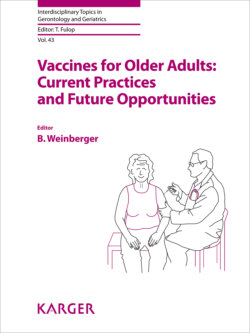Читать книгу Vaccines for Older Adults: Current Practices and Future Opportunities - Группа авторов - Страница 17
На сайте Литреса книга снята с продажи.
Inflammation and Innate Immunity
ОглавлениеWhile most vaccine responses are assessed by generation of antigen-specific memory T cells and protective antibody titers, proper activation of the innate immune system is essential for orchestrating this process. Innate immune cells create local cytokine and chemokine gradients to recruit cells to sites of damage or infection. They also carry antigen back to lymph nodes to initiate adaptive immune cell activation and expansion. During aging, many of these critical functions performed by innate immune cells become compromised, leading to poor overall immune protection and vaccine responsiveness. The chronically elevated basal levels of proinflammatory cytokines in the elderly lead to impaired responsiveness of innate immune cells by raising the threshold of activation, thereby compressing the dynamic range of responsiveness. Evidence from multiple studies in old mice illustrate the role of inflammatory cytokines in impaired innate immune function during aging. Splenic macrophages isolated from old IL-6-deficient mice have restored secretion of TNFα, IL-1β, and IL-12 after ex vivo stimulation with LPS [45]. Similarly, inflammatory monocytes were found to correlate with elevated serum TNFα and interfere with bacterial clearance from the lungs of old mice, but aged TNFα-deficient mice were able to effectively clear the infection [46]. Taken together, these data support a hypothesis that continuous bathing of innate immune cells in the inflammatory milieu of the aged individual reduces the abilities of these cells to sense and respond to signals such as tissue damage, infection, or vaccination.
